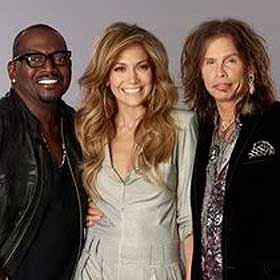American Idol, Season 10

3/5
One of the key differences between the premiere of any given season of American Idol and its subsequent episodes is that the two fall under slightly different genre categorizations: while the bulk of the season can be described as true reality television — its appeal in the vicarious thrill of watching one's favorite contender advance in a tense, emotionally voltaile competition — the premiere is more or less a cruel spectacle of ignoble failure: its viewers derive as much satisfcation from the unabashed displays of mediocrity as they do the judge's cruel treatment of the pop singing hopefuls — though surely less cruel now that the abominable Simon Cowell has been vanquished.
The time around, the panel consists of Steven Tyler, Jennifer Lopez and original judge Randy Jackson and of the two new additions, Lopez seems the most suited to the task: she's blunt and honest when she needs to be — certainly an improvement upon Paula Abdul, who struggled in this area — though the simple act of saying "no" seems very difficult for her.
Tyler seems something of a wild card: charming but slightly lecherous and liable to burst into song, swear or "act out" at any moment, certainly the most dynamic and entertaining judge; if anything, Tyler seems to be the most sunny and optimistic –though he does ask one oddball of a "joke" contestant if he ate paint chips as a child. Unfortunately, the loss of Cowell may mean the absence of true conflict and drama: no voice was more divisive or, for that matter, more honest. While the wise and realistic Jackson functioned as the happy medium between Abdul's gentle mothering and monstrous Cowell's articulate, incisive cruelty, the Lopez-Tyler-Jackson dynamic is a bit less clearly defined and therefore, at times, ungainly.
None of the judges have much feedback regarding the contestants looks and sense of dress–perhaps this was deemed a bit too un-p.c. as it used to be a prominent feature of the early stages–allowing for one less area of harsh judgement, and there appear to be only two distinct types of contestant at this stage: talented and absurdly untalented, to the point of suggesting "plants." Absent are those merely constituting well-intentioned mediocrity, often the most sympathetic of contestants as they may be aware of their tragic limitations or being infinitesimally "not good enough." Such contestants were also effectively pathetic because the viewing audience could relate to them in some way: after all, pretty much everyone can sing a little, and can therefore imagine encountering a similiar fate should he or she ever make a serious attempt at a career.
After sending four contestants on to the next round in Hollwood, the panel's treatment of the first real "joke" contestant, Achile, is surprisingly light and so the contestant takes it rather well: after she assures the unimpressed judges that she's working with a vocal coach to drop her Ivory Coast accent, Lopez bluntly explains that "it's not the accent." The decision to include an unsightly Jersey Girl stereotype with giant stars pasted on her breasts seems a little preemptive as well–a straw dog that even a polite judge could not resist devouring–but the producers could not have counted on the genuinely touching sight of the woman bursting into tears at the sight of Ms. Lopez, then giving quite a decent performance and moving onto the next round.
The second hour consists of a lot more heartbreak, but very little genuine pain. The Napoleon Dynamite clone takes his rebuff fairly well because he knows he's being held up to ridicule and may even enjoy it, so he may be having more fun than, say, the viewers at home who may — or may not! — see the inherent cheapness of his "planting" and Tyler's sarcastic musing that he may have a career in Broadway falls on leery ears. Even "super pathetic" Ashley who is introduced to the audience walking out of a Call-A-Head, and puts on a desperate teary display upon her tentative rejection is a bit too arrogant and self-involved to merit sympathy, so no one really cares when she finally gets a pass. The success of Travis, a formerly homeless contestant — singing the mournful "Eleanor Rigby" no less — is heartwarming, but it does beg the question of how upsetting his failure would have been had he proved less talented.
I'm sure many viewers may regard this is a nicer, gentler incarnation of the show, and may commend the judges and producers for this reason, but the show has lost something, perhaps the only thing it ever had going for it, which is the threat of danger: the danger of ridicule, rejection and humilation.
RELATED ARTICLES
Get the most-revealing celebrity conversations with the uInterview podcast!





Leave a comment